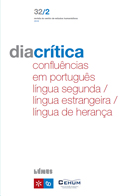Portuguese as heritage language and Portuguese non native language. (Re)construction of identities through the teaching-learning experience in the intensive summer course for luso-descendants at Madeira University
DOI:
https://doi.org/10.21814/diacritica.5109Keywords:
Portuguese heritage language, Portuguese non-native language, Luso-descendants, Venezuela and South Africa, MadeiraAbstract
This article fits into the topic “PL2 / PLE / PLH teaching-learning experiences”. The (re)construction of the identities of the Luso-descendants and other participants of the Intensive Summer Course for Luso-descendants (CIVLD), before and after attendance of the course, was studied through surveys and interviews to record the respective Life stories. For this, two surveys were developed, one for the students to complete at the beginning of the course and the other one, in the last class of the same, and the identity reconstruction was taking place throughout the teaching-learning experience. Data were collected on their motivation for attending the course, their expectations of the course and their learning of the Portuguese language (LP), their views of Madeira and its culture, before and after the course, as well as difficulties, both in language and social integration. Of these Luso-descendants, those who have Portuguese as a Heritage Language express themselves with many phonetic, lexical and morphosyntactic interferences of the Spanish of Venezuela orthe English of South Africa. The course also includes six Venezuelans (non-Luso-descendants), married with Luso-descendants from Madeira. They feel their coming to Madeira as an opportunity to create a new home, as well as the challenge of (re)constructing their identity, in contact with Portuguese Language and Culture.
References
Akhtar, H., Khan, A. & Fareed, M. (2016). Code-mixing and code-switching in EFL/ESL context: a sociolinguistic approach. Balochistan Journal of Linguistics, 4(1), 29-42. Disponível em: <https://www.researchgate.net/publication/315782612_code-mixing_and_code-switching_in_eflesl_context_a_sociolinguistic_approach>. Acedido em: 17 nov. 2018.
Bento, A. (2016). Análise de conteúdo na investigação qualitativa. et al. - Revista da Associação Académica da Universidade da Madeira, 83(1), 22-23.
Dervin, F. (2014). Cultural identity, representation and othering. In J. Jackson (Ed.), The Routledge Handbook of Language and Intercultural Communication (pp.181-194). Nova Iorque, Estados Unidos da América: Routledge.
Dias, E. M. (1989). Falares Emigreses – Uma abordagem ao seu estudo. Lisboa: Instituto de Cultura e Língua Portuguesa. Ministério da Educação e Cultura.
García, O. & Kleyn, T. (Eds.). (2017). Translanguaging with multilingual students. Nova Iorque & Londres: Routledge. DOI: https://doi.org/10.4324/9781315695242
Kerbrat-Orecchioni, C. (1997). La Enunciación de la Subjetividad en el lenguaje. (3a ed.) Buenos Aires, Argentina: Edicial. Disponível em: <http://www.seer.ufu-br.br/index>. Acedido em: 8 dez. 2018.
Melo-Pfeifer, S. (2018). Português como língua de herança: Que Português? Que Língua? Que Herança?. DOI: https://doi.org/10.14393/DL34-v12n2a2018-18
Domínios de Linguagem, 12(2), 1161-1179.
Melo-Pfeifer, S. (Ed.). (2016). Didática do Português Língua de Herança. Lisboa, Portugal: LIDEL.
Melo-Pfeifer, S. (2015). _e role of the family in heritage language use and learning: impact on heritage language policies. International Journal of Bilingual Education and Bilingualism, 18(1), 26-44. Disponível em: <https://doi.org/10.1080/13670050.2013.868400>. Acedido em: 8 dez. 2018. DOI: https://doi.org/10.1080/13670050.2013.868400
Oliveira, R. M. M. F. de (2011). Aprendizagem e representação da língua portuguesa por lusodescendentes (Tese de doutoramento, Universidade de Aveiro).
Rocha-Trindade, M. B. (2015). Das Migrações às Interculturalidades. Porto, Portugal: Edições Afrontamento.
Silva, M. F. (2009). Internacionalização da língua
portuguesa: Uma perspetiva sobre o global. Simpósio Mundial de Estudos de Língua Portuguesa, 2, Évora, 2009 - “A língua portuguesa: Ultrapassar fronteiras, juntar culturas” (pp. 1-5) Évora, Portugal: Universidade de Évora. ISBN 978-972-99292-4-3. Disponível em: <https://reposi-torioaberto.uab.pt/simplesearch?query=L%C3%ADngua+de+Heran%C3%A7a>. Acedido em: 12 set. 2018.
Sim-Sim, I. (1998). Desenvolvimento da Linguagem. Lisboa, Portugal: Universidade Aberta.
Sim-Sim, I. (2002). Desenvolver a linguagem, aprender a língua. In A. D. de Carvalho (Ed.), Novas Metodologias em Educação (Coleção Educação), vol. 8 (pp. 197-226). Porto, Portugal: Porto Editora.
Roy, B. K. (2017). Cultural identity and third space: An exploration of their connection in a title I school
(Dissertação apresentada para obtenção de grau parcial de doutoramento em Educação, Arizona State University).
Seals, C. A. (2018). Positive and negative identity practices heritage language education. International Journal of Multilingualism, 15(4), 329-348. Disponível em: . Acedido em: 8 dez. 2018. DOI: https://doi.org/10.1080/14790718.2017.1306065
Spinassé, K. P. (2006). Os conceitos de língua materna, segunda língua e língua estrangeira e os falantes de línguas alóctones minoritárias no sul do Brasil. Revista Contingentia, 1(1), 1-10. Disponível em: <http://seer.ufrgs.br/contingentia/article/view/3837/2144>. Acedido em: 12 set. 2018
Soares, S. M. C. C. D. (2012). Português língua de herança: Da teoria à prática (Dissertação de mestrado, Universidade do Porto).
Taveira, C. A. (2014). Aquisição do Português Língua Não Materna: Transferências Lexicais, Sintáticas e Morfossintáticas (Dissertação de mestrado, Universidade Aberta).
Torres, K. M. & Turner, J. E. (2017). Heritage language learners’ perceptions of acquiring and maintaining the Spanish language. International Journal of Bilingual Education and Bilingualism, 20(7), 837-853. Disponível em: <https://doi.org/10.1080/13670050.2015.1113927>. Acedido em: 8 dez. 2018. DOI: https://doi.org/10.1080/13670050.2015.1113927
Zhou, C., Cruz, M. & Frota, S. (2017). O ritmo da interlíngua na produção do Português Europeu por falantes chineses. Revista da Associação Portuguesa de Linguística, 3(9), 423-435. Disponível em: DOI: https://doi.org/10.26334/2183-9077/rapln3ano2017a22
<https://doi.org/10.26334/2183-9077/rapln3ano2017a22>. Acedido em: 17 nov. 2018.
Downloads
Published
How to Cite
Issue
Section
License
Copyright (c) 2023 Idalina Camacho, Naidea Nunes

This work is licensed under a Creative Commons Attribution-NonCommercial 4.0 International License.










